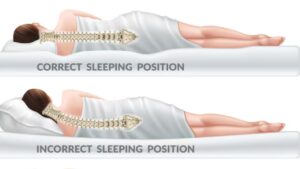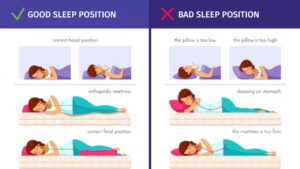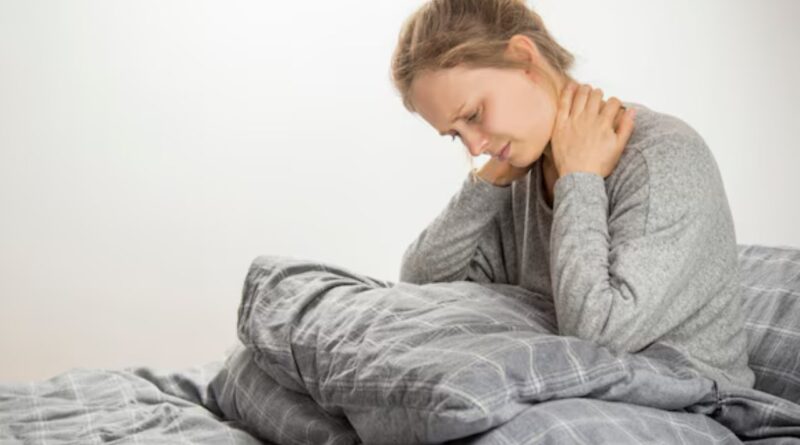upper back pain after sleeping
Why Upper Back Pain Recurs After Sleeping
Experiencing upper back pain after sleeping is common and can be caused by various factors. Poor sleeping posture, an unsupportive mattress, or muscle tension can contribute to discomfort.
Here are three key points:
- Poor sleeping posture: Sleeping in awkward positions can strain your upper back muscles, leading to pain upon waking.
- Unsupportive Mattress: A mattress that’s too soft or too firm may not provide the necessary support for your spine, causing upper back pain after sleeping.
- Muscle Tension: Stress and muscle tightness can worsen overnight, resulting in stiffness and pain in the upper back when you wake up.
What Causes Upper Back Pain After Sleeping?

Upper back pain after sleeping can be frustrating and is usually linked to everyday habits. Common causes include poor posture, an unsuitable pillow, and muscle strain.
Here are three main points:
- Poor sleeping posture: Lying in positions that twist your spine can lead to upper back pain after sleeping due to uneven pressure on muscles and joints.
- Incorrect Pillow Height: A pillow that is too high or too low can misalign your neck and upper back, causing pain.
- Muscle Strain: Daily stress and overuse of muscles can lead to tension that worsens during sleep, causing upper back pain after sleeping.
Sleeping Positions and Their Effect on Back Pain

If you wake up with upper back pain after sleeping, it’s mostly dependent on how you sleep. Certain positions can either support your spine or cause discomfort.
Here are three key points:
- Sleeping on Your Stomach: This position puts pressure on your spine and neck, often leading to upper back pain after sleeping.
- Side Sleeping: While this is generally a good position, curling too tightly can strain the upper back muscles, causing pain.
- Back Sleeping: Sleeping flat on your back with proper support can help maintain spinal alignment, reducing upper back pain after sleeping.
How to Manage Upper Back Pain

Managing upper back pain after sleeping involves making simple changes to your daily routine. Understanding the cause and taking proactive steps can help ease discomfort.
Here are some important points:
- Improve Sleeping Posture: Ensure you sleep on your back or side with proper spinal alignment to reduce upper back pain after sleeping.
- Choose the Right Mattress and Pillow: A supportive mattress and pillow that align your neck and spine can prevent pain.
- Stretch and Exercise: Regular stretches focusing on the upper back can relieve muscle tension and improve flexibility.
- Apply Heat or Ice: Using a heating pad or ice pack can help soothe inflamed or tight muscles.
- Maintain Good Posture During the Day: Sitting and standing with proper posture can prevent strain that contributes to upper back pain after sleeping.
- Stay Active: Regular physical activity strengthens back muscles and reduces pain over time.
- Manage Stress: Stress can tighten back muscles, so relaxation techniques like deep breathing or yoga can help.
- Consult a doctor: If upper back pain after sleeping persists, seek medical advice for proper evaluation and treatment.
Seeing a Medical Professional

If upper back pain after sleeping doesn’t improve with home remedies, it may be time to see a medical professional. Pain that does not go away after resting could indicate a more serious medical condition.
Here’s why you should consider consulting a doctor:
- Proper Diagnosis: A doctor can identify the exact cause of your upper back pain after sleeping and recommend the right treatment.
- Personalized Treatment Plan: You may need physical therapy, medication, or specific exercises to relieve your pain effectively.
- Prevent Further Issues: Early intervention can prevent your pain from becoming a long-term problem.
Treat your upper back pain with tried-and-tested physiotherapy techniques.

Physiotherapy offers effective ways to relieve upper back pain after sleeping. By using targeted exercises and therapies, you can reduce discomfort and improve mobility.
Here are some important techniques:
- Stretching Exercises: Gentle stretches for the upper back can help release muscle tightness and improve flexibility, easing pain after sleeping.
- Strengthening Workouts: Strengthening the back and core muscles helps support your spine, reducing upper back pain after sleeping.
- Posture Correction: Physiotherapists teach proper posture to prevent strain, which is crucial for reducing pain in the upper back.
- Manual Therapy: Hands-on techniques like massage can relieve muscle tension and improve blood flow, helping to alleviate pain.
- Heat and Ice Therapy: Alternating between heat and ice can reduce inflammation and soothe sore muscles in the upper back.
How to Handle Upper Back Pain Following Sleep
Upper back pain after sleeping can be challenging, but there are ways to manage it:
- Exercise: Gentle exercises like stretching, yoga, and strengthening your back muscles can help reduce upper back pain after sleeping. Focus on improving posture and flexibility.
- Over-the-Counter Medication: Taking over-the-counter pain relievers, such as ibuprofen or acetaminophen, can provide temporary relief from pain and inflammation in the upper back.
- Medical Intervention: If the pain persists, consult a doctor for a thorough evaluation. They may recommend physical therapy, chiropractic care, or other medical interventions to address the root cause of your upper back pain after sleeping.
What Causes Morning Back Pain?
Morning back pain, including upper back pain after sleeping, can be caused by several factors.
- Poor Sleeping Position: Everyone knows that sleeping in the wrong positions puts pressure on the spine and muscles, therefore arising with upper back pain next morning. It’s best to try not to bend your spine either to decrease irritation.
Inadequate Mattress Support: This is because an old or unsupportive mattress causes the back to be out of structure and aligned; hence, when you wake up, you experience upper back pain. Sleeping on a good mattress makes a lot of difference in the body, especially when one is suffering from any ailment.
Muscle Stiffness: Muscles become stiff when one does not change his or her position while asleep; thus, upper back pain is expected after sleeping. Morning stretching takes help from stretching muscles and relieves pain from tight muscles.
For the Best Sleeping Position, Keep Your Back Neutral.

To prevent upper back pain after sleeping, maintaining a neutral spine while you sleep is crucial.
Here are three tips:
- Choose the Right Pillow: Select a pillow that supports your neck and keeps your head aligned with your spine. This helps maintain a neutral position and reduces upper back pain after sleeping.
- Use a Supportive Mattress: A mattress that provides adequate support helps keep your spine aligned while you sleep. Avoid overly soft mattresses, as they can cause your back to sink, leading to upper back pain after sleeping.
- Sleep on Your Back or Side: Sleeping on your back or side rather than on your stomach can help maintain a neutral spine. This positioning minimizes strain on your upper back and reduces the risk of pain.





